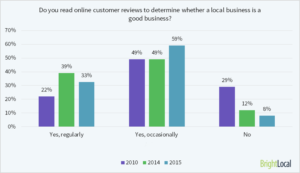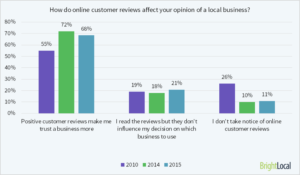When was the last time you searched for your business on Google?
Do you know what customers are saying about your brand on social media?
Because your reputation online is a critical factor of how potential customers perceive your business. If the first page results are filled with listings that contain words like “scam” or “ripoff”, visitors are likely to take their money elsewhere. Your business could be completely legitimate but a bad reputation will ultimately tank sales and drive visitors away.
A BrightLocal consumer survey found that 92% of consumers read online reviews to determine the quality of a local business.
This is hardly surprising.
Whether looking for a new restaurant or deciding on a contractor, consumers want to be sure of the quality they’re getting. And now they can do so by reading about the actual experiences from previous customers before shopping at a business.
The same survey found that 68% of consumers trust a business more if it has positive reviews:
No matter how you look at it your online reputation matters as it greatly affects how your business is perceived.
More consumers are now turning to social media and other channels to voice their opinions. Your customers are likely talking about your business whether tweeting about your products, sharing an update on Facebook or leaving a Yelp review.
Which is why reputation management is such a fundamental aspect.
Because it gives you a better understanding of what people are saying about your brand and it puts a system in place to address comments. You won’t be able to leave every customer completely satisfied. But taking a proactive approach to reputation management means being able to quickly and appropriately respond to any negative feedback.
Here we provide invaluable tips to manage your business reputation online.
1. Create Profiles on Major Social Media Platforms
Conversations are everywhere.
Facebook. Twitter. Google+. Instagram. Pinterest.
There are dozens of other social media platforms but these are the ones that your business should have a profile on at the very minimum. Consumers are increasingly using these channels for customer service requests such as complaints.
One customer tweeted a complaint to JetBlue about a broken TV on a four hour flight:
The company took immediate steps to rectify the situation:
Social media is an excellent channel to increase brand awareness. But it can also be an invaluable opportunity to turn negative situations into positive ones.
2. Respond in a Timely Manner
Customers are incredibly impatient.
Especially when something goes wrong.
United Airlines learned a costly lesson when it neglected to respond to constant complaints from Dave Carroll about his guitar that sustained damage while being transported. The singer created a song titled United Breaks Guitars that has since garnered over 15 million views on YouTube, generating bad press for the company.
You won’t be able to please every customer but ignoring legitimate complaints could diminish trust in your brand completely. A study from Lithium Technologies found that 53% of consumers expect a company to respond to their tweets in less than an hour. The figure goes even higher for complaints.
Respond quickly and appropriately to any messages you get on Facebook or Twitter.
3. Address Negative Comments Appropriately
Would you make the following comment to your customers?
Amy’s Baking Company became infamous when it was featured on Kitchen Nightmares. Gordon Ramsay actually backed out of the show because he felt the owners were too difficult to work with (a first occurrence in that show). The company received numerous criticisms across social platforms but how it handled that feedback is a different story altogether. The owners of the company then responded by criticizing and even insulting its customers.
Doing the same will only alienate your current customers and push new visitors away.
Here are some tips to handle negative comments about your business:
- Identify the category: Most negative feedback is either due to a business error or simply a misunderstanding. Knowing where the feedback falls under makes it easier to come up with a solution to address it.
- Don’t react negatively: Insulting a reviewer rarely ends well as seen from the example above. A defensive response can easily backfire and make a situation even worse.
- Admit the mistake: Mistakes happen. You might have sent the wrong product or simply overlooked a minor detail. Admit to the mistake and take steps to fix it whether by expediting the right product or offering a discount for a future purchase.
- Respond promptly: Responding promptly to negative feedback demonstrates that you care about your customers and are willing to take the steps to address it. The absolute worst thing you could is ignore or delete a negative comment.
Every business has at one point had to deal with negative feedback.
A new product might be delayed due to an unforeseen circumstance or the quality of a service rendered might be below expectations. Responding appropriately to negative criticism is a key aspect of reputation management and some situations can even be turned into a more positive light.
Conclusion
Customers are far more likely to engage with a business they trust. But all it takes is several instances of negative feedback to tank the reputation of a brand. Taking a proactive approach to reputation management helps you see what customers are saying about your business and puts you in a better position to respond appropriately to any negative feedback.





